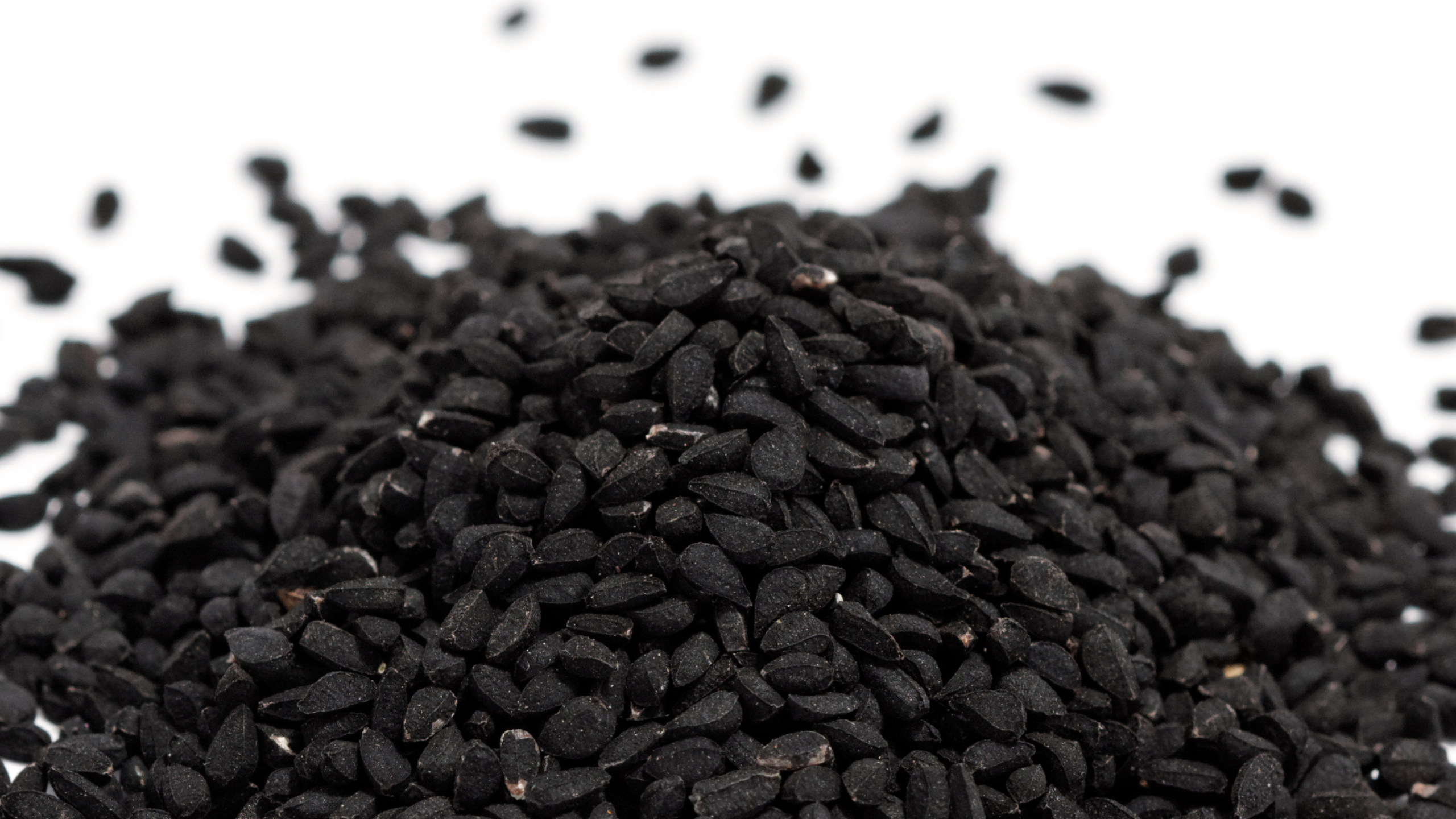In the world of nutrition and holistic wellness, certain ingredients stand out for their exceptional health benefits. One of these powerhouse ingredients is black cumin seed, a tiny yet mighty seed that has been revered for centuries for its medicinal properties.
Black cumin seed, scientifically known as Nigella sativa, has a rich history deeply rooted in traditional medicine. It’s been used for centuries in various cultures, from ancient Egypt to traditional Ayurveda and Islamic medicine [1]. Renowned for its diverse therapeutic qualities, black cumin seed has earned titles like the “Seed of Blessing” and the “Remedy for Everything but Death” [2].
Nutritional Profile
One of the key reasons black cumin seed has garnered attention is its impressive nutritional profile. Packed with antioxidants, essential fatty acids, vitamins, and minerals, these tiny seeds offer immense nutritional value. They are a rich source of omega-3 and omega-6 fatty acids, as well as important nutrients like iron, calcium, potassium, and magnesium [3].
Health Benefits:
- Immune Support: Black cumin seed is hailed for its immune-supporting properties. It contains compounds like thymoquinone, known for their anti-inflammatory and antioxidant effects, contributing to a strengthened immune system [4].
- Digestive Health: The seeds have been traditionally used to promote digestive health. They may help alleviate digestive issues, reduce bloating, and support a healthy gut microbiome [5].
- Anti-Inflammatory Properties: Chronic inflammation is a common denominator in various health issues. Black cumin seed has shown promise in reducing inflammation, offering potential relief for conditions influenced by inflammatory processes [6].
- Heart Health: The heart-protective benefits of black cumin seed contribute to overall cardiovascular well-being [7].
- Skin and Hair Care: The seed’s nutritional content is beneficial for maintaining healthy skin and hair [8].
Rain International’s Commitment:
At Rain International, we understand the significance of incorporating powerful, natural ingredients into our products. Black cumin seed is a cornerstone in our formulations, enriching our supplements with its diverse health benefits. We believe in providing you with nutrition that not only supports your daily needs but also contributes to your long-term well-being.
References:
[1] Goyal, S. N., et al. (2017). Nigella sativa: A comprehensive review. Indian Journal of Pharmacology, 49(2), 172–180.
[2] Ahmad, A., et al. (2013). A review on therapeutic potential of Nigella sativa: A miracle herb. Asian Pacific Journal of Tropical Biomedicine, 3(5), 337–352.
[3] Butt, M. S., Sultan, M. T., & Qayyum, M. M. (2010). Nigella sativa: reduces the risk of various maladies. Critical Reviews in Food Science and Nutrition, 50(7), 654–665.
[4] Randhawa, M. A., & Alghamdi, M. S. (2011). Anticancer activity of Nigella sativa (black seed) – a review. The American Journal of Chinese Medicine, 39(6), 1075–1091.
[5] Okeola, V. O., & Adaramoye, O. A. (2019). Nigella sativa seed oil and its bioactive compound thymoquinone: The new melanogens causing redox imbalance and glutathione depletion in malignant melanoma cells. BioFactors, 45(6), 951–964.
[6] Tavakkoli, A., Ahmadi, A., Razavi, B. M., & Hosseinzadeh, H. (2017). Black seed (Nigella sativa) and its constituent thymoquinone as an antidote or a protective agent against natural or chemical toxicities. Iranian Journal of Pharmaceutical Research: IJPR, 16(1), 2–23.
[7] Ahmad, A., et al. (2013). A review on therapeutic potential of Nigella sativa: A miracle herb. Asian Pacific Journal of Tropical Biomedicine, 3(5), 337–352.
[8] Razavi, B. M., Hosseinzadeh, H., & Abnous, K. (2016). Effect of thymoquinone and Nigella sativa seeds oil on lipid peroxidation level during global cerebral ischemia-reperfusion injury in rat hippocampus. Phytomedicine: International Journal of Phytotherapy and Phytopharmacology, 23(13), 1557–1565.


